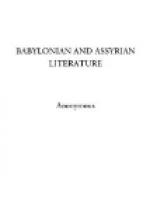THE REVOLT IN HEAVEN
(The first four lines are broken. They related, no doubt, that a festival of praise and thanksgiving was being held in heaven, when this rebellion took place.)
5 The Divine Being spoke three times, the commencement
of a psalm.
6 The god of holy songs, Lord of religion and worship
7 seated a thousand singers and musicians: and
established
a choral band
8 who to his hymn were to respond in multitudes
... 9 With a loud cry of contempt they broke up
his holy song 10 spoiling, confusing, confounding,
his hymn of praise. 11 The god of the bright crown
[1] with a wish to summon his
adherents
12 sounded a trumpet blast which would wake the dead,
13 which to those rebel angels prohibited return,
14 he stopped their service, and sent them to the
gods who
were his enemies.[2]
15 In their room he created mankind.[3] 16 The
first who received life dwelt along with him. 17
May he give them strength, never to neglect his word,
18 following the serpent’s voice, whom his hands
had made. 19 And may the god of divine speech [4]
expel from his five
thousand [5] that wicked thousand
20 who in the midst of his heavenly son, had shouted
evil
blasphemies!
21 The god Ashur, who had seen the malice of those
gods who
deserted their allegiance
22 to raise a rebellion, refused to go forth with
them.
(The remainder of the tablet, nine or ten lines more, is too much broken for translation.)
[Footnote 1: The Assyrian scribe annotates in the margin that the same god is meant throughout, under all these different epithets.]
[Footnote 2: They were in future to serve the powers of evil.]
[Footnote 3: It will be observed that line 15 says that mankind were created to fill up the void in creation which the ungrateful rebellion of the angels had caused. A friend has supplied me with some striking evidence that the mediaeval church also held that opinion, though it was never elevated to the rank of an authorized doctrine.]
[Footnote 4: See note 4. This is another epithet.]
[Footnote 5: The total number of the gods is, I believe, elsewhere given as 5,000.]
THE LEGEND OF THE TOWER OF BABEL
TRANSLATED BY W. ST. CHAD BOSCAWEN
This legend is found on a tablet marked K, 3,657, in the British Museum. The story which the tablet contains appears to be the building of some great temple tower, apparently by command of a king. The gods are angry at the work, and so to put an end to it they confuse the speech of the builders. The tablet is in a very broken condition, only a few lines being in any way complete.
The late Mr. George Smith has given a translation of the legend in his work on Chaldean Genesis, and I have published the text and translation in the fifth volume of “Transactions of the Society of Biblical Archaeology.”




